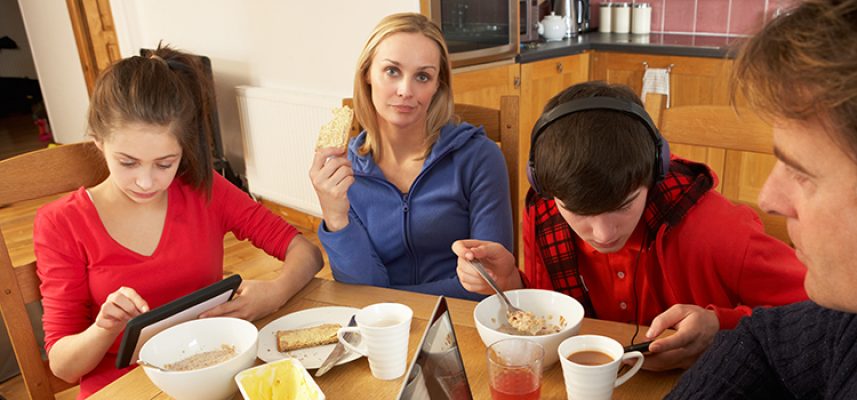ActivityHero providers are experts at getting kids to go (temporarily) off the grid. Here 6 of their tips to help your family welcome more tech-free time.
By Rachel Stamper
Tech is typically banned at school and during after school activities — and for good reason: Smartphones and tablets distract kids from instructional time. At bedtime, exposure to blue light from smartphones, tablets, computers, and the TV can actually make it tougher for kids and adults to fall asleep because the light they emit prevents the release of melatonin, the hormone that regulates sleep. And with 20 digital devices in the average home, according to a recent Yahoo! poll, there are plenty of screens competing for your family’s attention. Left unchecked, all that screen time could affect your relationship with your children, the quantity and quality of sleep your family gets, and how engaged your kids are during the school day and at activities.
To get some help in corralling the tech, we reached out to a few ActivityHero providers who are experts on powering down kids’ smartphone usage — at least temporarily. Here, we offer their suggestions, along with our own research, to help you figure out the best times and ways to use a little less data each day.
1. Get an Old-School Alarm Clock
“Today too many people use their phones as alarms. That means it’s super-tempting to check your social media or favorite news sites right before you go to sleep,” says Ed Caballero, Executive Director of Camp Edmo, which offers high-quality enrichment programs in science, technology, reading, engineering, arts, and math. His suggestion: Leave your phone in another room to recharge at night, and use a regular alarm clock to rise in the morning. “It’s also a great to give your body a break from being close to that radiation for 6 to 10 hours a day,” he adds. A standard clock with a battery backup is just as reliable as a cell phone alarm.
Find Fun After School Activities Near You >>
2. Schedule Some Official “Silent Times”
Caballero also says, “You might have a hard time keeping the cell phone out of your child’s hand at all times. However, you can establish Silent Times like dinner, family gatherings, etc., when the phone is set to silent. When you don’t have the angst of wondering if your phone vibrated, pinged, or rang, you can actually be more present and conversational. By turning your phones to silent, you can focus on the people you’re with and check messages at socially appropriate times — when you’re alone later.” Whether it’s dinner at home, at a restaurant, or at a special event, if everyone powers down at the same time, there’s a sense of fairness. (Yes, that means us adults, too!)
3. Reframe the Conversation
Blake Longfellow, Co-owner and Director of UCamps, which provide fun, educational, arts, leadership, and outdoor enrichment programs, allows only counselors, not kids, to have cell phones. “When I promote the summer programs, kids always ask can they have their phones,” he says. “I reframe the conversation to remind them if they don’t have their cell phones, their parents can’t tell them what to do.” Kids can make their own choices, choose their own classes, decide who they “hang out” with, and get a break from “parental communication.” Rather than focusing on what you might miss by unplugging, talk about how you’ll be able to positively experience the world without a digital distraction.
4. Don’t Break Electronics Bans
Longfellow adds, “We have a no-phone policy for campers and it’s the parents that complain — 90 percent of the kids are okay with it. Some parents will try and sneak in a phone, but having a phone can foster homesickness. In previous years, 10 or 11 kids left camp each summer due to homesickness, but since we set a phone ban, no kids have asked to leave. Kids are more present and enjoy the time without a phone.” Promise yourself now that you won’t fight phone bans at school or activities, no matter how inconvenient it may seem at first. When you set a good example, says Longfellow, “This teaches kids to respect your phone rules too.”
5. Think About Your Own Habits
Clinical psychologist Dr. Catherine Steiner-Adair, author of The Big Disconnect: Protecting Childhood and Family Relationships in the Digital Age, says that it’s not just parents who are upset about tech interruptions; it’s kids who hurt, too. “We as parents have to be much more mindful about … interacting with technology when our children need us …. Children of all ages — 2, 15, 18, 22 — used the same phrases to talk about how hard it is for them to get their parents’ attention when they need it: sad, angry, mad, frustrated.” By putting down your digital device, you model this habit for your kids. This means no checking your phone at mealtime, while in the car, or during family time. It may be a challenge at first, but imagine what a relief it will be to have some off-the-grid moments when no one can steal your serenity with a stressed-out email or text.
6. Go “Old School” in the Evenings
The blue light of devices is particularly bad in the two to three hours before bedtime. To help your kids get the right quantity and quality of sleep, consider reading paper books or playing board games in the evening rather than using eBooks or apps before bed. A recent study by Brigham and Women’s Hospital in Boston showed that screen activity before bed makes it harder to fall asleep. Dr. Anne-Marie Chang says, “The best recommendation (although not the most popular) would be to avoid use of light-emitting screens before bedtime.” Plus, board games improve executive function (the brain’s control of cognitive processes such as memory, reasoning, and problem-solving) and let you bond and engage with your kids. Just be sure to silence your phones first!
Give Tech-Loving Kids Another Option
If your child simply loves technology, take a look at the computer programming and coding classes available on ActivityHero! This is a great way to support your kids’ interest in electronics in a way that allows them to learn, socialize, and possibly prepare for a future career.

















